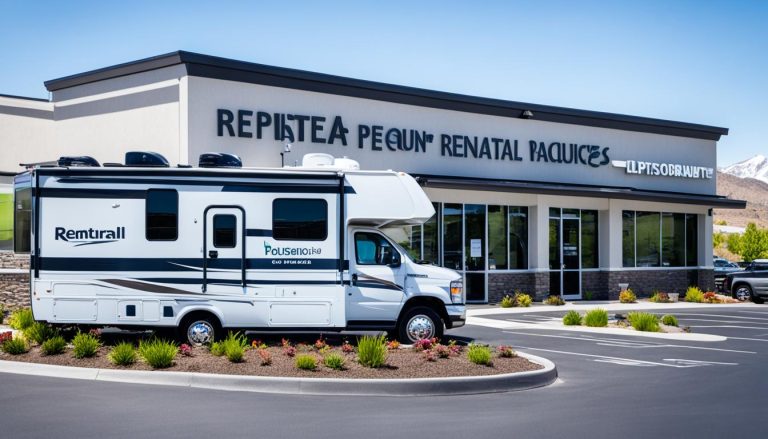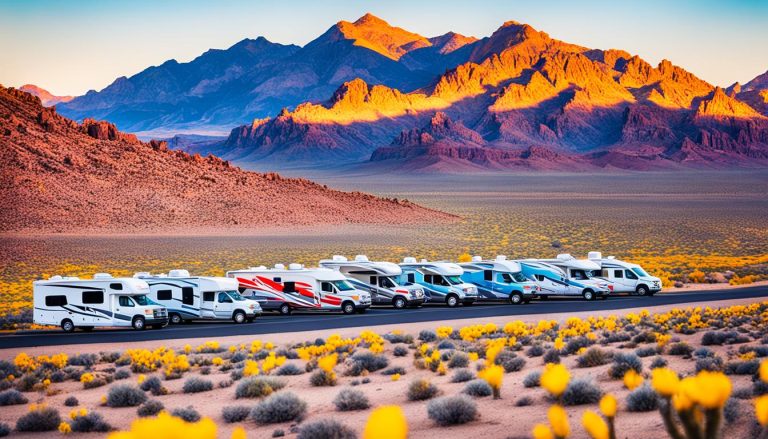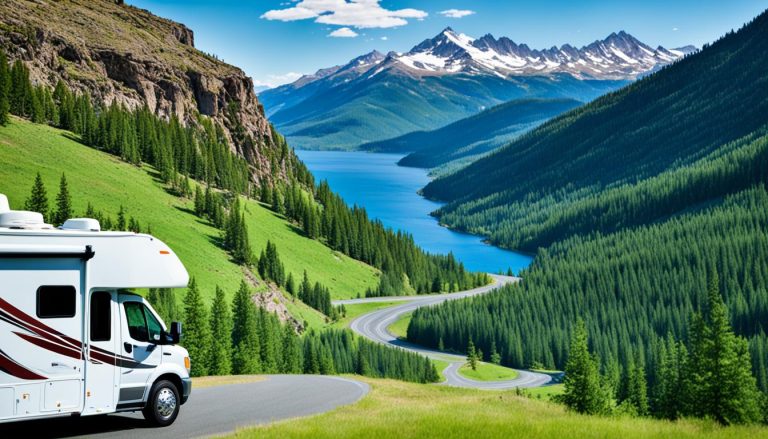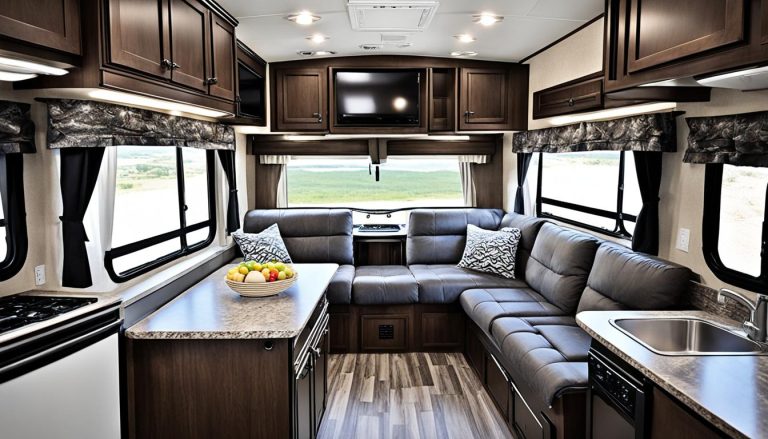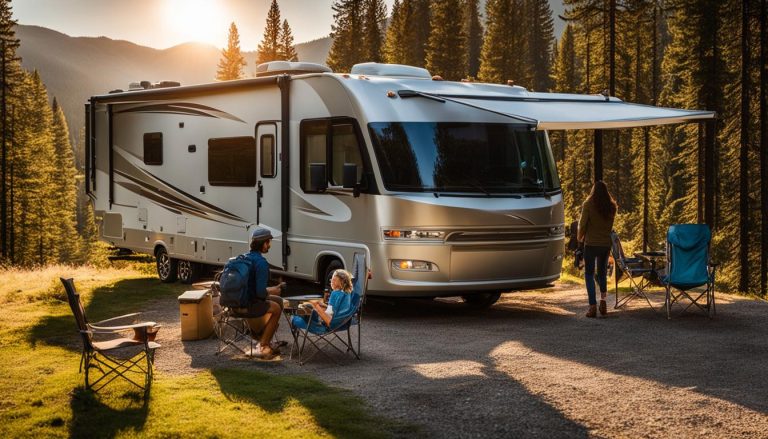Essential Tips for First-Time RV Renters Guide
gorvlifestyle.com and its partners may earn a commission if you purchase a product through one of our links
Embracing the nomadic allure of an RV adventure is an experience like no other. As tips for first-time RV renters can be invaluable, this guide aims to navigate through the exciting yet intricate landscape of embarking on a home-on-wheels journey. Renting an RV for beginners doesn’t have to be daunting; it’s a gateway to discovering the freedom of the open road while enjoying the cozy comforts of home. Whether it’s scaling the panoramic routes of national parks or waking up to oceanfront sunrises, an RV rental guide equips you to make these dreams a reality. From selecting the right vehicle to planning picturesque paths, meticulous budgeting to meal prepping, the journey starts with gearing up for the ultimate road trip—where every turn brings a new memory.
Key Takeaways
- Identify the perfect RV type that suits your travel needs and comfort levels.
- Engage in thorough route crafting and meal preparation for an organized trip.
- Adapt budgeting skills specific to RV travel, taking into account all potential costs.
- Consult seasoned RVers or utilize an RV rental guide to optimize your planning.
- Include your travel companions in the planning to ensure everyone’s expectations are met.
Understanding Different Types of RVs and Rental Options
Embarking on an RV adventure starts with selecting the right vehicle that meets your travel needs and preferences. With a multitude of options available, comprehending the varieties of motorhomes and the intricacies of rental agreements is vital. This knowledge serves as your roadmap on how to rent an RV, providing practical tips for renting a camper, and helps you prepare an essential RV rental checklist.
Class A, B, C: Matching Your Motorhome to Your Needs
Motorhomes come in various sizes and styles, each with its own set of characteristics. Class A RVs are the epitome of space and luxury, ideal for long journeys and larger groups. Class B campers, often known as conversion vans, provide a more compact, efficient option for travelers who favor maneuverability and simplicity. Class C RVs strike a balance, offering a middle ground with a mix of comfort and mobility that appeals to a wide range of road trippers. Taking the time to tour different models and layouts is crucial to finding the one that feels like a home away from home.
Peer-to-Peer RV Rentals vs. Traditional Rental Companies
Renting through peer-to-peer platforms such as RVshare presents a unique opportunity for a personalized and potentially more cost-effective experience. Unlike traditional rental companies, peer-to-peer services allow you to rent directly from RV owners, opening a door to a more diverse fleet and varying policies on mileage and usage. Here’s a quick overview to help you discern which rental path may suit you:
| Rental Option | Vehicle Diversity | Mileage Policy | Personalized Experience |
|---|---|---|---|
| Peer-to-Peer Rentals | High | Varies by owner | More personal interaction |
| Traditional Rental Companies | Standardized | Often fixed limits | Standard customer service |
Additional Costs and Rental Packages Explained
Awareness of the additional costs associated with renting an RV is crucial for proper budgeting. These can include insurance, security deposits, and various fees such as for mileage and generator use. Rental packages may differ between providers, with some offering inclusive deals that cover amenities like kitchen kits and linens. Exploring these options will ensure no surprises on the road and help maintain your budgetary peace of mind.
- Insurance: Check what’s covered and what’s optional.
- Mileage Fees: Consider how far you plan to travel versus the allowed mileage.
- Amenities: Evaluate the convenience versus cost of rental packages on offer.
Preparing for the Road: Anticipating the Challenges of RVing
When it comes to venturing out on your very first RV trip, weighing the leisures against the logistical challenges is key. An adventure on the road demands adaptability and a knack for problem-solving, especially in the confined space of a recreational vehicle. Those looking for RV rental advice should be aware of the balance between the excitement of exploration and the reality of living in close quarters. To facilitate a seamless experience, here’s an essential guide full of first-time RV trip tips.
Discussing potential concerns prior to departure can help mitigate issues that may arise from spending extended periods of time in an RV. From the distribution of personal space to cohabitating in a communal living area, ensuring that all travelers are comfortable is paramount. For many, the charm of an RV journey lies in the unpredictability and the chance to bond with travel companions, with an emphasis on shared experiences over individual luxury.
In order to keep the trip enjoyable for everyone, consider creating a travel agenda that incorporates diverse destinations. The allure of RV travel is found in its inherent flexibility—enabling families, friends, and solo adventurers alike to meander through scenic byways, park in tranquil nature preserves, or bask in the glamor of high-end RV resorts. Each stop along your route should offer something that appeals to the various interests within your group.
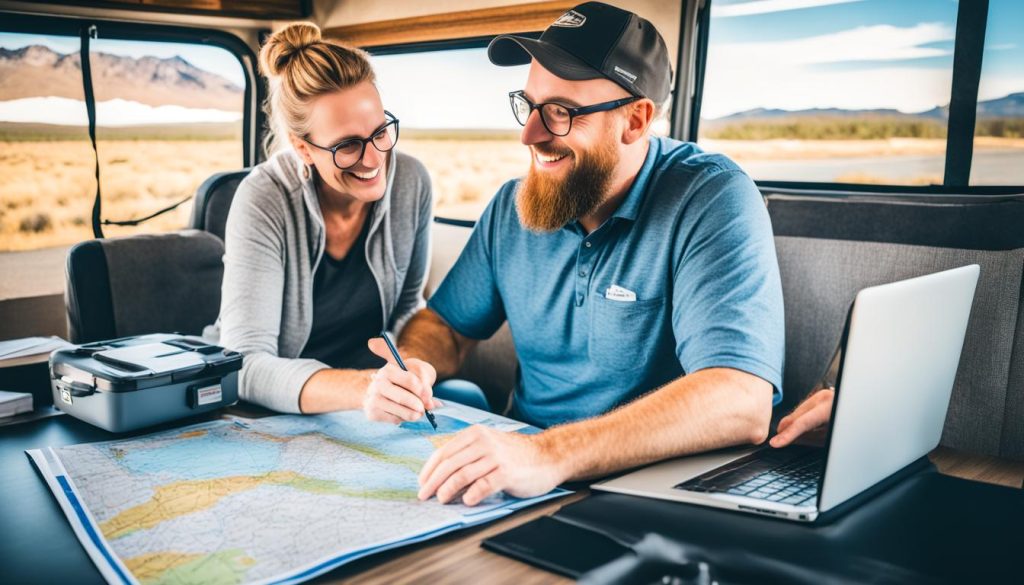
Anticipating the ebb and flow of campervan living is easier with a well-constructed plan. Use the table below to assess and organize potential challenges alongside tips to ensure your RV adventure is as harmonious as possible.
| Challenge | Advice |
|---|---|
| Managing Small Spaces | Designate personal areas and storage to give everyone their own space. |
| Lengthy Stretches of Travel | Break up driving days with scenic stops and local attractions. |
| Shared Living Arrangements | Set ground rules for cleanliness and privacy to respect each traveler’s needs. |
| Meal Preparation and Dining | Plan and prep meals together to foster a collaborative spirit. |
| Activity Planning for Varied Interests | Involve everyone in the itinerary planning for a diverse set of experiences. |
By highlighting these aspects beforehand and aligning expectations, you can elevate your RV experience from satisfactory to exceptional. Whether seeking serene solitude or engaging in lively campground get-togethers, a touch of foresight paired with a dash of flexibility paves the way for an unforgettable RV odyssey.
Tips for First-time RV Renters
Embarking on an RV journey offers a sense of freedom and adventure, but it also requires careful planning and budgeting. By following these expert RV rental tips, you can ensure that your RV vacation is as enriching as it is cost-effective. Whether you’re budgeting for an RV trip or packing for maximal space and comfort, attention to detail can make all the difference in your travel experience.
Creating a Budget for Your RV Adventure
Planning your finances ahead of time can help avoid unexpected costs and ensure a stress-free getaway. Consider not only the RV rental cost but also the price of campgrounds, fuel, attractions, meals, and an emergency fund for unforeseen expenses. Parks and campground fees may vary greatly, and gas consumption should be calculated based on the distances you plan to cover. Factor in the costs for planned activities and a daily allowance for meals to maintain a realistic and manageable budget.
Essential Planning: Routes, Activities, and Accommodations
Selecting the best routes and activities requires thorough research but can greatly enhance your RV experience. Planning an RV vacation involves considering a variety of RV-friendly accommodations to fit your travel style. You might opt for full-service RV parks or seek unique overnight stays at farms or vineyards offered through programs like Harvest Hosts. This approach not only provides memorable experiences but can also introduce cost savings and connect you with local culture.
Packing Tips for Space Management and Comfort
Efficient packing is vital for managing limited RV space. Prioritize multipurpose items and avoid overpacking. Organizational tools like vacuum-sealed bags and stacking shelves can maximize space, and a clear list of essentials will keep you from forgetting anything vital. Remember to include tools and safety equipment alongside your personal belongings to be prepared for any situation on the road.
Navigating Campgrounds and RV Parks
When it comes to renting an RV, the journey doesn’t end with selecting the perfect set of wheels; it spills over into the choice of your nightly oasis. Campgrounds and RV parks are more than mere places to rest; they are communities that serve as focal points for your adventure, offering a mix of amenities, atmosphere, and access to nature’s playground.
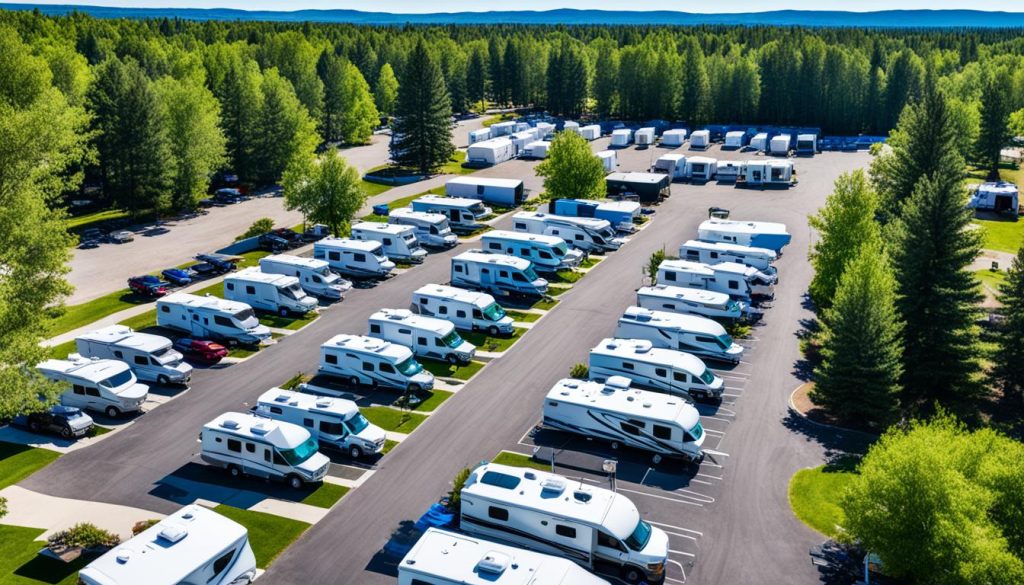
The diligent RVer knows that thorough research into potential stops can make all the difference. Utilizing online platforms such as ReserveAmerica or Kampgrounds of America (KOA) can help you delve into a plethora of options, where you can filter your search according to specifications like location, facilities, and ratings. Leveraging RV park reviews, left by those who have ventured before you, will provide authentic insights and help set expectations for both the splendors and the nitty-gritty of your upcoming accommodations.
Be aware that campground fees can be as varied as the landscapes they inhabit. To prevent surprises on your bill, here’s a comprehensive look at what costs you might encounter and the specific services they correspond to:
| Service | Typical Fee | Frequency | Notes |
|---|---|---|---|
| Standard Site | $25 – $80 per night | Nightly | Includes parking space and access to park amenities |
| Full Hookups | $30 – $100 per night | Nightly | Water, electricity, and sewage hookups for the RV |
| WiFi Access | $0 – $10 per day | Daily | Varies widely by park; may be included in standard fee |
| Generator Rental | $10 – $30 per day | Daily | For campsites without electricity hookups |
| Additional Vehicle Parking | $5 – $20 per night | Nightly | Fee for vehicles in addition to the RV |
| Laundry Facilities | $1 – $4 per use | Per Use | Access to washers and dryers |
To cap off the preparatory process, take a moment to consider the period of your stay; some parks offer discounts for extended visits or return customers. By weaving together an informed choice of campgrounds and managing your spend on campground fees with foresight, the art of renting an RV becomes not just a transaction, but a tapestry of planned experiences and serendipitous joys ready to unfold on the open road.
Maximizing Your Budget: Hidden Costs and Savings
Embarking on an RV adventure brings with it the allure of freedom and the open road. However, to truly enjoy this unique experience without financial strain, it’s essential to be acutely aware of both the overt and the concealed expenses associated with an RV rental. Understanding and managing these costs effectively can indeed make the difference between a carefree excursion and a trip fraught with budgetary concerns.
Understanding Rental Mileage and Gas Expenses
Fuel economy is seldom the forte of an RV, and when planning your travels, considering the RV rental costs related to mileage and gas is paramount. Rental companies often have a set rate per mile after an allocated amount, which can add up especially on a long-distance trip. Seasonal variations such as summer prices can further elevate costs, pushing the need for effective budget planning to the forefront.
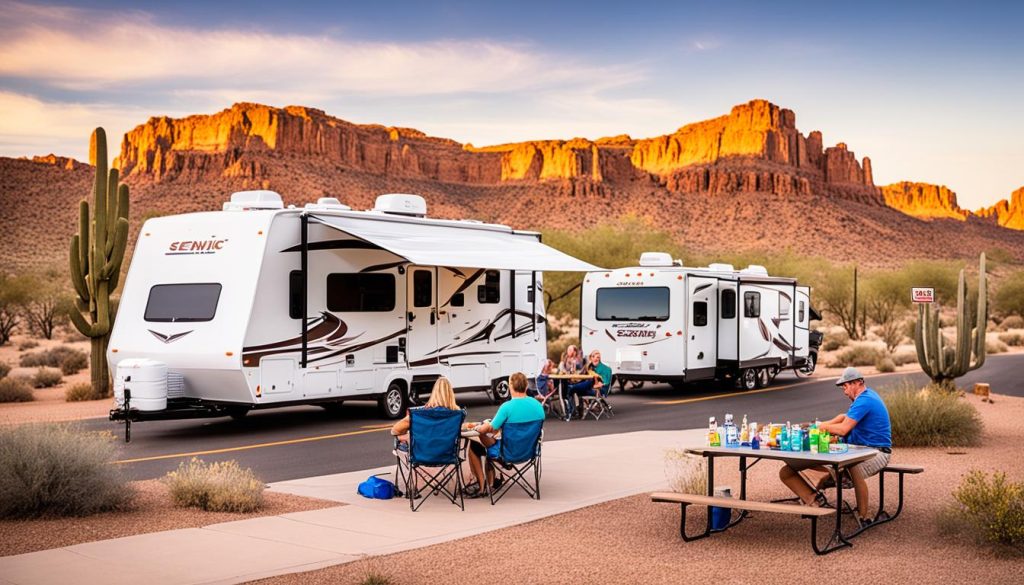
Saving on Food and Extras While on the Road
Eating out during your RV adventures can quickly escalate your spending, but saving money on RV trips can be as simple as utilizing the onboard kitchen. Preparing meals in your RV not only cuts costs but also allows for a more home-like and cozy dining experience. Additionally, consider what is included in your rental package — items such as generators and bicycles might save you rentals at campsites or local outfitters.
Insurance and Deposit Fees: What to Expect
Before you drive away in your home-on-wheels, companies will require a deposit and insurance to cover any potential damages. It’s wise to familiarize yourself with the RV insurance considerations, the extent of the coverage, and the deductible costs. Some personal auto insurance policies may not cover RV rentals, so obtaining additional insurance might be necessary and should be accounted for in the travel budget.
Incorporating these understanding and savings tactics will ensure that you are better prepared financially and more equipped to enjoy your RV experience to the fullest.
Making the Most of RV Amenities and Features
Exploring the great outdoors by RV combines the freedom of the open road with the comforts of home. To truly revel in the travel experience, renters should take full advantage of the RV amenities and features available. Whether it’s a weekend jaunt or a cross-country odyssey, understanding and utilizing RV hookups and RV park facilities can significantly enhance your stay, providing all the convenience and comfort you could need.
How to Utilize Full Hookups for a Comfortable Stay
When selecting a campsite, one of the key features to look for is the availability of full RV hookups, which include water, electricity, and sewage connections. These hookups allow you to use your RV’s facilities to their fullest extent. Here’s how to set them up safely:
- Electricity: Connect your RV’s power cord to the site’s electrical hookup, ensuring it matches your RV’s voltage requirements.
- Water: Attach a potable water hose from the hookup to fill your RV’s water tank, providing access to fresh water.
- Sewer: Use a sewer hose to connect your RV’s waste system to the campground’s sewage system for convenient disposal.
Expert Advice on Using Onboard Appliances and Electronics
Take the time to become familiar with the onboard equipment provided with your RV. Most come equipped with a refrigerator, stove, heating, and air conditioning systems, and some have added luxuries like microwaves or entertainment systems. It’s recommended to:
- Read through the RV’s manual or ask the rental company for a walkthrough.
- Ensure you understand the power supply requirements for each appliance.
- Test appliances briefly before you set out to guarantee they’re in working order.
Leveraging RV Park Facilities and Resources
Most well-managed RV parks offer a bevy of resources and facilities designed to make your stay as comfortable as possible. From laundry services and convenience stores to communal spaces and activity areas, these amenities are at your disposal. To maximize your enjoyment:
| Facility | Description | Benefits |
|---|---|---|
| Laundry Room | Equipped with washers and dryers | Maintain clean clothes without leaving the park |
| Swimming Pool | Often includes a lounge area | Relaxing and fun activity for families |
| Recreational Room | Games, TV, communal seating | Socialize with fellow travelers |
| Convenience Store | Stocked with RV supplies and groceries | Access to essentials and emergency items |
RV Driving and Handling Tips for Beginners
Embarking on an RV adventure may seem daunting if you’ve never been at the helm of a motorhome before. With the right RV driving tips for beginners, anyone can conquer the road with confidence. Here’s a starter guide to Handling an RV with precision and taking an RV test drive for reassurance.
Before you hit the road, familiarize yourself with your RV’s features and controls. It’s much more than just a larger vehicle; it’s your home on wheels. To ensure you’re thoroughly prepared, consider the following actionable tips:
- Take an RV test drive to get a feel for the size and handling, preferably with a seasoned instructor or an experienced RVer at your side.
- Practice maneuvers like parking, reversing, and navigating through different types of roadways.
- Don’t rush. Give yourself ample time to reach your destination, avoiding the stress of tight schedules.
- Stay aware of the RV’s clearance height to prevent any overhead accidents with bridges or low-hanging branches.
- Double-check that all cargo is secured properly to prevent shifts that could impact balance and handling.
Always remember that the community of RVers is known for its supportive nature. Don’t hesitate to reach out to fellow road travelers or your rental dealership for advice. Safe travels!
Maintenance and Upkeep During Your RV Rental Period
Embarking on an RV journey brings a sense of adventure and requires a commitment to proper vehicle maintenance and upkeep to ensure the trip remains enjoyable and free from unnecessary interruptions. By addressing RV maintenance proactively, renters can sustain the condition of their temporary home on wheels, minimize the impact of RV issues, and keep their focus on the unfolding road ahead.
Managing Water, Electricity, and Waste Efficiently
Efficient management of an RV’s vital resources is not only eco-friendly but also essential for uninterrupted travel. Renters must monitor their water usage, understand how to maintain electrical systems, and dispose of waste responsibly. This might include utilizing RV-specific fixtures aimed at conserving water, such as low-flow faucets, and staying mindful of electrical loads to prevent blown fuses or drained batteries. Waste should be disposed of at designated dump stations or recycling centers to keep the environment and your campsite clean and pristine.
Quick Fixes and Troubleshooting Common Issues
Even the best-prepared traveler can encounter unexpected RV issues. A fundamental knowledge of troubleshooting common problems — like a malfunctioning water heater or a finicky generator — will serve you well. Many RV maintenance checklists include tasks such as checking tire pressure and adjusting satellite dishes, both of which are manageable quick fixes that can prevent more significant troubles down the road.
Tips for Keeping Your RV Clean and Organized
RV cleanliness and organization play a vital role in creating a harmonious travel environment. Strategies such as creating a cleaning schedule, using space-saving storage solutions, and decluttering regularly help maintain an orderly and pleasant living space. Employing simple organizational tools like over-the-door shoe organizers, magnetic strips for metal utensils, and nesting bowls can make a world of difference in a compact space.
Embracing the RV Lifestyle: Community and Etiquette
Embarking on an RV journey does more than transport you through the scenic landscapes of the United States—it introduces you to a unique and vibrant RV lifestyle characterized by camaraderie and shared values. Aligning yourself with the established RV community comes with an unspoken responsibility to adhere to the norms and rules of RV travel etiquette, which ensures a pleasant experience for both yourself and others. From the moment you set foot in a campground, you’ll notice the blend of independence and community that defines the RV way of life.
A key element of the RV experience is the level of respect and consideration travelers show one another. Noise control is a prime example; preserving the tranquil environment of nature, RV enthusiasts are mindful of their sound levels, ensuring that fellow campers can also enjoy peaceful surroundings. Similarly, space management is crucial. Given the close quarters of many RV parks and campgrounds, utilizing the space you’ve rented efficiently and respectfully goes a long way in maintaining harmony and preserving the integrity of the collective retreat.
Engaging with the RV community can vastly enrich your travels. Seasoned RVers often share insights and tips that are invaluable for both greenhorns and experienced travelers alike. Warm exchanges of stories around campfires, assistance with navigating the particularities of RV upkeep, and shared celebrations of the wonders of travel all foster an inclusive atmosphere. By embracing and contributing to this supportive network, every participant in the RV community plays a role in enhancing the collective journey, underlining that the true essence of RVing is as much about the people you meet as the places you explore.

